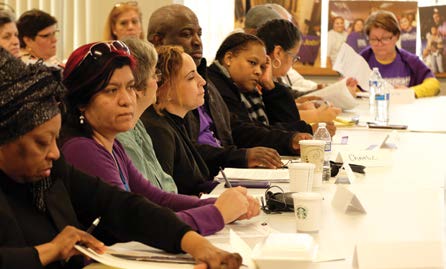Massachusetts Home Health Workers Build Strength Despite Obstacles
April 16, 2019
Recent Supreme Court decisions are challenges, but not a crippling blow.

With its damaging Harris v. Quinn and AFSCME v. Janus decisions, the U.S. Supreme Court rendered all public-sector jobs “right to work.” At press time, the Trump administration was on the verge of issuing a new rule that takes away PCAs’ right to pay dues through payroll deductions.
These attacks, coordinated by the anti-labor far right, have made it more difficult for caregivers to advocate for higher wages, training opportunities, and affordable healthcare. Seniors and people with disabilities face new challenges in finding consistent, quality homecare.
And 48,000 PCAs represented by 1199SEIU in Massachusetts must now re-affirm their Union membership and agree to an alternative dues collection process.
But they’re far from the predicted deathblow to worker power. Instead, the decisions have mobilized an army of caregivers; in Connecticut, Oregon, and Illinois, home care workers negotiated improved training programs; in Washington State, they won their first-ever retirement plan; and in Massachusetts, PCAs are determined to fortify their Union, win better contracts, and develop a more skilled workforce. To that end, rank-and-filers and Union staff recently fanned out across the Commonwealth and reached out to other PCAs to re-affirm the home health workers’ Union membership.
“Why would I not belong to the Union as a PCA? It just makes sense.“
–Ann Krebs, PCA, Worcester, MA
Canvassers also shared collective bargaining developments and encouraged participation in political action programs. Ann Krebs, a PCA in Worcester, re-upped her Union membership during the blitz. She cares for her 17-year-old grandson, who has learning and developmental challenges. Union membership just makes sense, says Krebs.
“It’s just logical. I worked for the state and I had a Union there. Why would I not belong to the Union as a PCA?,” she says.
Krebs says Union membership and resources is vital for PCAs, who work independently and often alone with clients.
“Sometimes PCAs need training. Some of us have high-needs consumers and you can’t get the kind of training you need everywhere all the time,” she says.
“The fact that the Union helped get us [$15 an hour] is really a compliment to our Union strength,” she says. “And now we have to fight to get that even higher.”
From Door-To-Door to the Bargaining Table At press time, PCAs had been three times to the bargaining table for contract negotiations. (Many of them fresh from the outreach blitz.) While the sessions yielded progress, workers were focused on a strong agreement that includes wage and healthcare improvements; provisions for more paid time off, additional training and clarity in job descriptions and responsibilities.
Negotiating committee member Rosa Santiago, who works in Dorchester caring for her 83-year-old mother, says healthcare and secure benefits are vital to PCAs. Santiago has experienced homelessness and serious medical issues over the course of her PCA career.
“What I make is not enough to pay for an apartment in the Boston area,” she says. “What I have been through is tough, so I know what we are fighting for. People around her might look at me and never think I have been homeless. It’s great that we are strong in our bargaining with the state. We need our Union and we need better wages.”
1199 Magazine | March / April 2019

